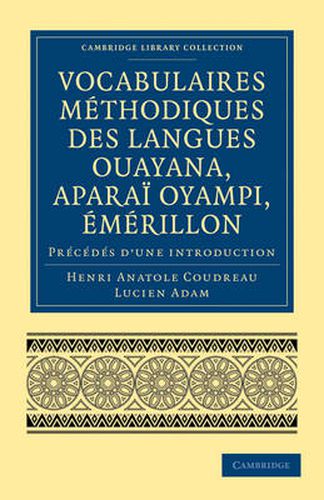Readings Newsletter
Become a Readings Member to make your shopping experience even easier.
Sign in or sign up for free!
You’re not far away from qualifying for FREE standard shipping within Australia
You’ve qualified for FREE standard shipping within Australia
The cart is loading…






Henri Coudreau (1859-1899) was one of the greatest explorers of the nineteenth century. This 1892 book, containing vocabulary lists for four Amazonian indigenous languages, derives from his three expeditions to French Guyana described in La France Equinoxale (1887, also reissued in this series) and Chez nos Indiens (1892). Three of the languages belong to the Carib family, while the fourth, Emerillon is a Guarani-Tupi language. Coudreau’s word lists, each organised by topics and grammatical categories, and subdivided partly alphabetically and partly by semantic field, represented a huge advance on previous publications on these languages, both in terms of quantity and in terms of syntactic data (examples of different persons and tenses). Dialect variation is also recorded in the case of Ouayana (Wayana) and Oyampi, which Coudreau encountered in two different areas. Coudreau’s record remains a valuable resource for scholars of Native American languages and their history.
$9.00 standard shipping within Australia
FREE standard shipping within Australia for orders over $100.00
Express & International shipping calculated at checkout
Henri Coudreau (1859-1899) was one of the greatest explorers of the nineteenth century. This 1892 book, containing vocabulary lists for four Amazonian indigenous languages, derives from his three expeditions to French Guyana described in La France Equinoxale (1887, also reissued in this series) and Chez nos Indiens (1892). Three of the languages belong to the Carib family, while the fourth, Emerillon is a Guarani-Tupi language. Coudreau’s word lists, each organised by topics and grammatical categories, and subdivided partly alphabetically and partly by semantic field, represented a huge advance on previous publications on these languages, both in terms of quantity and in terms of syntactic data (examples of different persons and tenses). Dialect variation is also recorded in the case of Ouayana (Wayana) and Oyampi, which Coudreau encountered in two different areas. Coudreau’s record remains a valuable resource for scholars of Native American languages and their history.